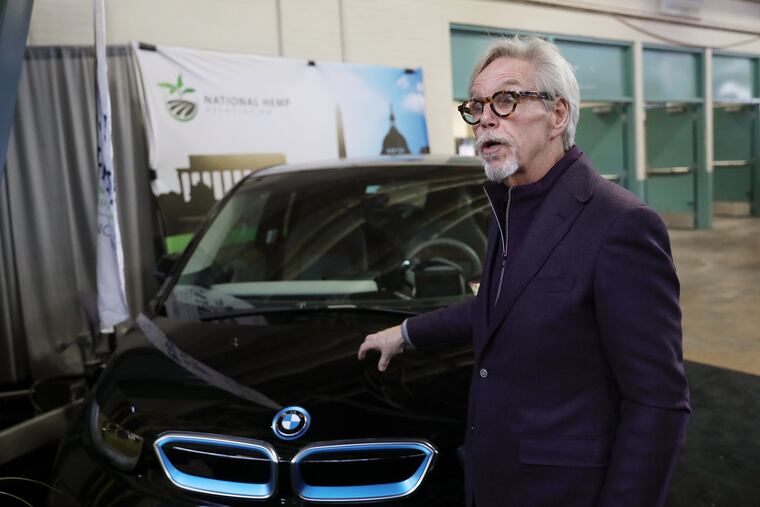It’s a silky suit, a mini house, a pricey car — all from hemp. Pa.’s ‘Hemperor’ struts wares at Farm Show.
Geoff Whaling is perhaps America’s most enthusiastic evangelist for hemp, which analysts say could grow into a $25 billion industry by 2025.

Geoff Whaling, wearing a violet suit fashioned of hemp, waxed rhapsodically about his 2017 BMW.
“It’s not just all-electric — it’s 14% hemp,” Whaling said, his hand caressing the driver’s-side fender of the jet-black i3. The electric vehicle’s shell is molded from hemp bioplastics, the dashboard is a hemp composite, striped with eucalyptus. The seat covers, floor mats, and sound insulation? All hemp. Even the battery baffle is hemp-based.
“I’ll bet you don’t know this but hemp conducts electricity,” Whaling said. “It’s lighter and holds the charge longer.”
Whaling, Pennsylvania’s self-styled “hemperor,” is chairman of the National Hemp Association. He is perhaps America’s most enthusiastic evangelist for hemp, which analysts say could grow into a $25 billion industry by 2025.
At the weeklong Pennsylvania Farm Show, Whaling commanded a 1,200-foot-square exhibition space exclusively focused on hemp’s manufacturing potentials.
Next to Whaling’s gleaming Beemer stood a mini-house on wheels with walls built of 12-inch-thick “hempcrete.” “It’s a misnomer,” said Cameron McIntosh, president of Americhanvre Cast-Hemp of Allentown. “More accurately, it’s hemplime.”
A small electric mill extracted a nutty-flavored hemp oil from hemp seed. “People always ask if it will get them high,” said Les Stark, a leading hemp advocate and historian who works with Whaling. “Nope. Not a chance.”
Mannequins were outfitted with hemp fashions: a silky sport coat direct from the runways of Milan, a parka, and a dress. A table held an assortment of more prosaic products, including a hemp fiber skateboard, hemp rope, and hemp-derived salves and balms.
Other independent stands scattered throughout the massive farm show complex highlighted hemp tea, hemp pretzels, hemp fabrics, and even hemp kitty litter. The 2020 Farm Show marked the fourth year that Whaling’s hemp advocacy group has participated. “We need to think about how far we’ve come,” he said.
It was only in November 2018 that hemp was legalized as a commodity crop by the federal government. Because of its similar appearance to marijuana, hemp effectively had been illegal in the U.S. for 50 years following the Marijuana Tax Act of 1937. Previously, hemp products could be grown only under experimental research programs or imported from other countries.
Last year, Pennsylvania farmers cultivated 4,000 acres of industrial hemp. Across the nation, growers harvested more than 146,000 acres of marijuana’s nonintoxicating cousin, according to federal data. New Jersey is launching its first forays into hemp farming this year.
At first glance, the sky would seem to be the limit for aspiring hemp farmers and the future of the crop.
But there’s a key part missing: an infrastructure that can process hemp into usable materials.
“Unless we have a supply chain, there’s no point in growing any of this,” Whaling said.
Hemp requires specialized equipment to render it into fiber, neutraceuticals, oil, and biomass. And because the industry is just getting off the ground, there aren’t enough processors to handle the bounty.
The shortage of processors has sent a chill through the nascent industry. Until the infrastructure is in place — a network that can provide harvesting and processing equipment — farmers may be reluctant to plant hemp this year.
On Wednesday, Whaling announced that the National Hemp Association had partnered with New Holland Agriculture and Farm Machinery, which is part of the global Fiat Chrysler empire owned by CNH Industrial NV.
The partnership aims to “accelerate the return of hemp as a commodity crop onto farmlands across North America,” according to a statement.
The two groups plan to visit 16 farm shows this year. They hope to gauge the interest of up to 115,000 farming professionals and lay a foundation for an integrated hemp supply chain.
“We want to assure farmers that if they grow it, we will be there for them,” Whaling said. “Manufacturers tell me they’d love to use hemp in their products, but right now there’s no supply chain. Farmers say they’d love to grow it, but where do they sell it?”
“All of that has to be accomplished,” Whaling said. “It’s not a chicken-and-egg issue; it’s kind of scrambled eggs problem.”
Since the Farm Act of 2018 made growing hemp legal for commercial purposes, it’s quickly reestablishing itself as an American cash crop. Farmers are enticed by the promise of huge profits. Where corn might generate $300 in profits per acre and tobacco $1,000 to 3,000, hemp can return upwards of $10,000 an acre, analysts say.
Much of the interest in hemp comes from the booming market in CBD, or cannabidiol. CBD is a hemp extract that some claim is good for reducing anxiety and pain — though there is no scientific proof yet that it is effective.
Whaling last year briefly served as an executive with Canopy Growth, a huge Canadian cannabis company that is banking big on CBD- and THC-infused drinks.
But dietary supplements and intoxicating beverages are only the tip of the “hempberg,” he maintained.
“CBD represents only 2% of the potential for this crop,” Whaling said. With a sweep of his hemp-clad arm, he added, “Just look at all this.
“As you can see with your own eyes, hemp is so much bigger.”
The Pennsylvania Farm Show continues Jan. 10 (8 a.m. to 9 p.m.) and Jan. 11 (8 to 5) at the Farm Show Complex in Harrisburg. Admission is free. Parking is $15, including a shuttle bus to the exhibition buildings. Information: www.farmshow.pa.gov